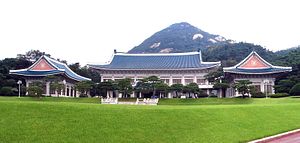The South Korean economy is buckling under the pressure of the won’s rising value and China’s diminishing demand. In addition, the service industry has yet to recover from the precipitous decline in consumer spending after the Sewol ferry disaster.
To make matters worse, the state statistics office this week affirmed the widespread belief that income inequality in South Korea is growing when it announced that the country’s Gini coefficient widened from 0.256 to 0.280 between 1990 and 2013. Along with an Asian Development Bank working paper from February of this year, which showed that inequality in South Korea grew fifth fastest among 28 Asian nations, these socioeconomic indicators suggest that the gap between the haves and the have-nots will increasingly take center stage in the public’s measure of the government’s performance.
This is bad news for the Park Geun-hye government, which appears unready to tackle these major issues. The cabinet is currently hobbled by President Park’s controversial nominee for prime minister, who has come under fire over several inflammatory comments he made regarding South Korea’s colonial history. And while the Blue House’s decision to nominate Choi Kyoung-hwan as the next finance minister is far less controversial, Choi’s contradictory statements on the government’s role in the market and the ongoing dispute over tax policy will no doubt make it difficult for the Park administration to advance a coherent economic policy.
Unlike the nominee for prime minister, Choi Kyoung-hwan is very qualified for the positions he was nominated for (he was also nominated as deputy prime minister for economic affairs). The three-time Saenuri assemblyman holds a doctorate in economics from the University of Wisconsin and previously served as the minister of knowledge economy (a portfolio that is now split between the Ministry of Science, ICT and Future Planning and the Ministry of Trade, Industry and Energy), where he earned a reputation for undertaking his responsibilities with precision. He also previously served as commerce minister.
Nonetheless, Choi’s nomination sends ambiguous signals to South Korean markets. In a press interview, Choi emphasized that he will not measure success by the country’s GDP growth rate but by improvements in people’s quality of life. This is a welcome statement to a public that is increasingly conscious of the growing income inequality in the country. At the same time, however, Choi said it was essential to achieve 6 to 8 percent annual growth to prepare for the looming demographic shift.
In another example of his inconsistency, Choi noted that the government was no longer capable of significantly influencing economic conditions because the market was the dominant force in the South Korean economy. Yet, when the issue of a fiscal stimulus was raised in the National Assembly in May, he fully endorsed the idea, going so far as to suggest tapping into the state’s sacrosanct foreign exchange reserves.
As is often the case in South Korea, the most divisive issue facing both Choi and the Park government is the housing market. The two major debates in public policy right now are government-imposed limits on mortgage loans and the taxes levied on rented property. Choi has come out in support of lifting the cap on mortgage loans to further spur the housing market. However, many analysts fear that such a policy would result in increasing both household debts and non-performing loans, the harbinger of the traumatic Asian Financial Crisis of the late 1990s.
On the issue of taxation too, observers are divided. Despite reaching a consensus in the National Assembly last year to levy the tax on rental properties, both parties and the government buckled as soon as the outcry against the tax turned out to be greater than expected. Choi has taken the more popular position, championing the removal of the tax by arguing that the government-imposed financial burden has slowed the real estate market. But some groups, including several government departments, have continued to defend the tax. The Korea Development Institute (KDI) noted that people were overreacting to slowing property purchases as the market always tends to slow around April and May. In addition, KDI noted that house prices haven’t fallen, suggesting that the alleged adverse effects of the tax are overstated.
Choi’s position on these two issues, despite expert opinions cautioning against his policy recommendations, have led some to question whether the nominee for deputy prime minister is engaging in populist rhetoric to bolster party support. If true, this bodes poorly for governance in South Korea.
Equally important, divisions within the government and between public institutions on these key issues, coupled with Choi’s own inconsistencies, reveal that Seoul is unprepared to advance a coherent and unified economic policy that could restore market confidence. In addition, while the housing market is a critical component of the inequality question in South Korea, the public policy discussion has so far centered around how to buoy property prices, not necessarily on how to improve the standard of living for those who do not own property.
All this shows that the Park Geun-hye administration has yet to find its footing.

































